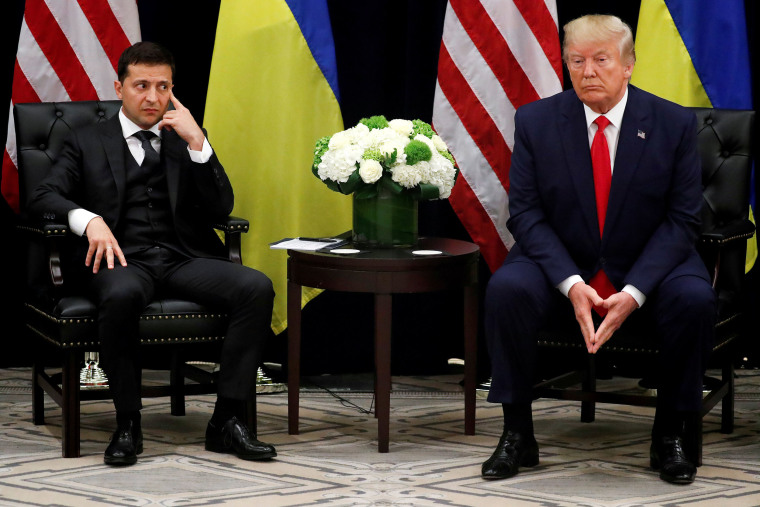The White House on Friday released a record of President Donald Trump's first phone conversation with his Ukrainian counterpart, a brief call in which the two chatted amicably and made no mention of the Bidens or the 2016 election.
The tone of the call was largely congratulatory, according to the memo. Then-President-elect Volodymyr Zelenskiy quickly invites Trump to visit his country, and later Trump issues a general invitation to the White House.
"I'd like to congratulate you on a job well done, and congratulations on a fantastic election," Trump said in the call from Air Force One, referring to Zelenskiy's landslide election win.
"It's very nice to hear from you, and I appreciate the congratulations," Zelenskiy tells Trump, according to the White House record, adding that Trump's own victory in 2016 was "a great example."
The record of the call was released at 9 a.m., just as Day 2 of the House's public impeachment hearings stemming from Trump's July call with Zelenskiy began. Trump later tweeted out the call record during the hearing.
The record appears to depict a more lighthearted conversation than the one that occurred in July, and runs counter to the White House's own description of it at the time. A White House readout of the call released publicly in April said that during the conversation, the president expressed his commitment to work with Ukraine “to implement reforms that strengthen democracy, increase prosperity and root out corruption” — but there's no mention of reforms or corruption in the rough transcript released Friday.
Asked about the discrepancy, White House spokesman Hogan Gidley sidestepped, saying the president "continues to push for transparency" and call summaries show "he did nothing wrong." The only thing he said directly about the readout was that “it is standard operating procedure for the National Security Council to provide readouts of the President’s phone calls with foreign leaders. This one was prepared by the NSC’s Ukraine expert.”
That person is Lt. Col. Alexander Vindman, who is scheduled to testify publicly next week in the impeachment inquiry.
Trump tweeted earlier this week that the April call was "the first, and therefore more important, phone call."
Rep. Devin Nunes of California, the ranking Republican on the House Intelligence Committee, read the call record out loud in his opening statement at Friday's impeachment hearing.
Nunes said he read the transcript aloud "so now the American people know the very first call that President Trump had with President Zelenskiy."
Intelligence Committee Chairman Adam Schiff, D-Calif., said he was grateful that the president had released the call record, adding, "I would now ask the president to release the thousands of other records that he has instructed the state department not to release."
Trump, Schiff said, has "obstructed witnesses in their testimony and production of thousands and thousands of other records."
Trump, who's been portrayed by House Republicans as carrying a grudge against the Ukrainian government stemming from the 2016 election, told Zelenskiy in April: "I think you will do a great job. I have many friends in Ukraine who know you and like you. I have many friends from Ukraine and they think — frankly — expected you to win. And it's really an amazing thing that you've done."
Zelenskiy thanked Trump again, and invited him to his inauguration, touting his country as a great place to visit. “There’s no word that can describe our wonderful country. How nice, warm and friendly our people are, how tasty and delicious our food is, and how wonderful Ukraine is. Words cannot describe our country, so it would be best for to see it yourself,” Zelenskiy said.
Trump said he agreed, and cited his beauty pageant experience. “When I owned Miss Universe, they always had great people. Ukraine was always very well represented,” Trump said.
Trump promised that at "a very minimum," a high-level delegation of U.S. government officials would attend Zelenskiy's inauguration, before asking Zelenskiy to come for a White House visit.
“We’ll have a lot of things to talk about, but we’re with you all the way,” Trump said.
Zelenskiy responded: “We accept the invitation and look forward to the visit. Thank you again.”
Trump then tells Zelenskiy: “Congratulations — and please, say hello to the Ukrainian people and your family. Let them know that I send my best regards from our country.”
The president-elect told Trump he'd practice his English ahead of the meeting, getting Trump to laugh.
"All that's beautiful to hear! That's really good. I could not do that in your language. I'm very impressed," he said.
The next time the two spoke in July, Trump complained that "we do a lot for Ukraine" but "I wouldn't say that it's reciprocal necessarily" before asking Zelenskiy to "do us a favor" and investigate a conspiracy related to the 2016 election. He also asked Zelenskiy to look into former Vice President Joe Biden and his son Hunter Biden.
Asked in his deposition why Trump's attitude towards Ukraine had soured so much after that first call in April, senior State Department official George Kent testified on Wednesday that he thought it was because of conversations Trump had with regional rivals Russian President Vladimir Putin and Hungarian Prime Minister Viktor Orban, as well as his personal lawyer, Rudy Giuliani.
Kent testified that it was his "takeaway" that "their communications with President Trump shaped the president's view of Ukraine and Zelenskiy, and would account for the change from a very positive first call on April 21 to his negative assessment of Ukraine" that Trump shared with other administration officials in a May 23 meeting.

